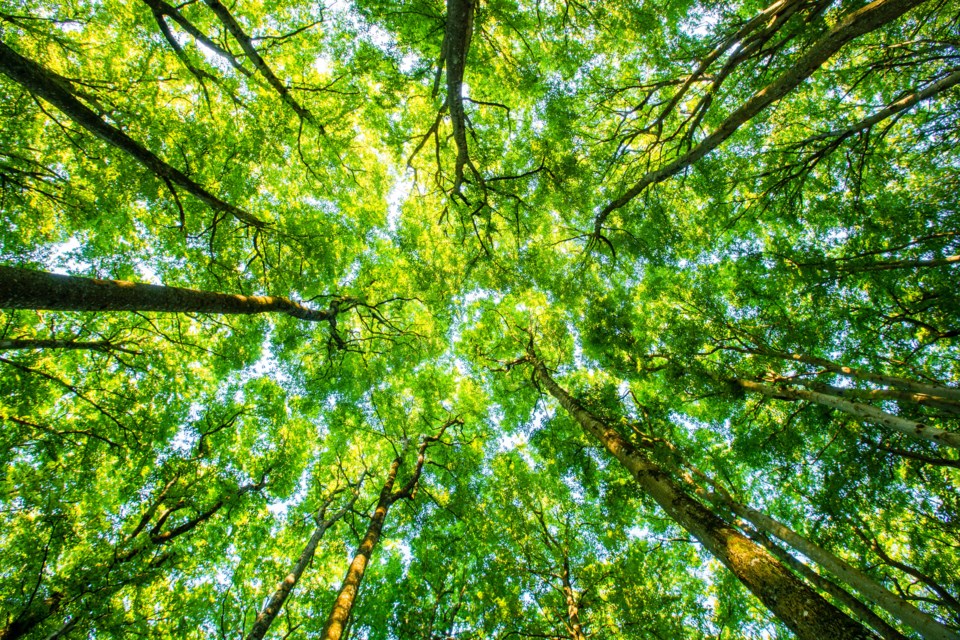Property owners who want to cut down large trees on their land will soon be paying more for permits in the District of North Vancouver.
And landowners who want to cut down trees on adjacent municipal land as part of their development plans will also be forking over cash.
Those who break the rules will also be facing the prospect of much heftier fines – up to $50,000, from the current $10,000.
Those are among changes being brought in by the district as part of the process of updating its tree protection bylaw, first adopted 10 years ago, with the goal of curtailing the number of clearcuts and significant trees being axed on private property.
The District of North Vancouver’s tree bylaw regulates cutting of all trees with a diameter bigger than 75 centimetres, requiring permits for their removal. It also regulates tree removal within special development permit areas and of heritage trees and trees of particular species that are also protected. Those include arbutus, Garry oak, Oregon ash, Pacific yew, western white pine and yellow cedar trees as well as wildlife and old growth trees, and trees on district property.
Permit fees increasing
Council recently gave third reading to changes to the tree bylaw that will increase many tree-cutting permit fees.
The permit fee for cutting up to four large-diameter trees will go from $84 to $100. For five to nine trees, the permit fee will jump from $397 to $500, and for 10 or more trees on a parcel larger than one hectare, the permit will go up from $2,053 to $2,500.
The environmental compensation fee paid to the district in lieu of replanting will also increase – from about $600 to $1,000 for most large trees and to $2,000 in cases where the large trees are either western red cedars or Douglas fir trees.
In one significant addition, developers will also be required to pay for permits to remove otherwise large trees on municipal land where the tree removal occurs as a result of development on adjacent property.
District staff noted in a report to council that now is an optimal time to make changes to the bylaw, as tree cutting is generally prohibited during the later spring and early summer months as part of bird nesting season.
“Bird nesting season ends at the end of August and staff typically see an influx of permit applications for tree work at this time,” staff noted in a report.
Heat dome, looper moth damage being assessed
Meanwhile, field assessments will be carried out this summer on the impacts of both the heat dome and looper moth infestations of last year, said Richard Boase, manager of environmental sustainability for the district.
While some trees look bad now, the long-term impacts won’t be known until at least one subsequent growing season has happened, said Boase.
The district is also looking at creating possible incentive programs for both homeowners who retain certain large trees on their properties and others who remove trees deemed hazards in fire interface areas.
Coun. Lisa Muri said she sees an incentive program to keep trees as crucial to the ability to cool neighbourhoods in future heat waves. Neighbourhoods with mature trees stayed cooler than those without them during last year’s heat home, said Muri.
“Losing the canopy is a challenge, and we have to make sure we protect it the best we can,” she said.
Not all council members were keen on keeping as many trees as possible.
Coun. Mathew Bond said probably as many local residents want trees cut as want to keep them.
Mayor Mike Little said he has mixed views on tree retention.
Wildfire dangers loom
“Our community does need to look through an emergency management lens,” he said. “We’re going to have a catastrophic fire on the North Shore at some point” and having a “defensible space” around houses will be key to protecting them.
The community of Whistler also used to feel “every tree is sacred,” said Little, but with recent wildfires “the mood shifted entirely.”
Providing subsidies for owners to cut hazard trees, including those that have been impacted by the looper moth infestation, in forest fire interface zones is another issue of forest management the district is examining.
[email protected]
twitter.com/JaneSeyd



